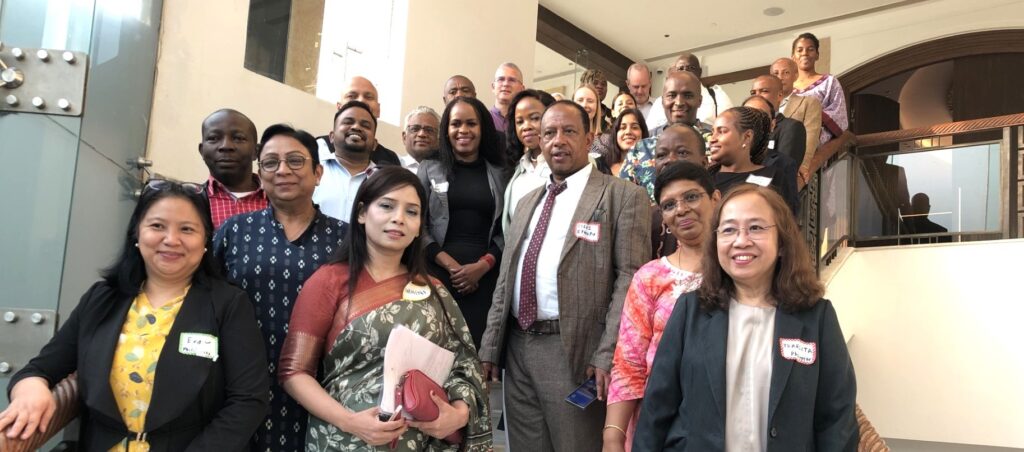The Power of Collaboration: Identifying Solutions to Shared Health Finance Challenges
The Power of Collaboration: Identifying Solutions to Shared Health Finance Challenges
By Sara Wilhelmsen, Jacob Hughes, Denise Silfverberg, and Natsumi Ellis

As we concluded 2024, we found ourselves reflecting on the Collaborative on Contracting Organizations for Health-Related Services and how far it has come over the last nine months. Organized by USAID’s Health Systems for Tuberculosis (HS4TB) project, led by Management Sciences for Health (MSH) in partnership with the Joint Learning Network for Universal Health Coverage (JLN), we have convened 40 participants from 12 countries in 4 virtual meetings and one in-person gathering in India. Country members are keen to learn about government-led health contracting: hiring not-for-profit (NGO and CSO) and/or for-profit organizations for specific health or other health-related services using a country’s own procurement systems and domestic funds. It is an essential element in mixed (public plus private) health systems where the public sector can leverage the skill sets and engage diverse health system actors, resulting in a more sustainable health system.
In many of the member countries, overall funding for TB has dropped. Contracting offers a pathway to domestic sustainability for countries that currently rely on donor-supported NGOs/CSOs for parts of their health system operations. Though Collaborative participants come with valuable experience in non-government provision of individual health services (e.g. via insurance), how to establish government-funded contracting of public health actions (PHAs) is less clear. In TB, these PHAs have been almost exclusively funded and managed by donors, and TB program managers are starting from scratch in most countries. The highlight of the collaborative so far has been our in-person meeting in October when 21 public sector leaders from 10 countries gathered for a three-day meeting in New Delhi, India. One participant remarked that “the meeting provided insight that countries, despite their differences, face similar challenges in establishing government-led contracting. It is a great opportunity to learn from one another.” The meeting proved its value by deepening participants’ understanding of many of the issues involved in contracting, exploring new ones, interacting with Indian implementers (government, NGOs, HS4TB India), and strengthening their peer network. Participants engaged with local senior government leaders to learn from India’s experience with health service contracting, including the Joint Secretary for TB and Central TB Department. Development partners including the World Bank and USAID were also among the participants. There were hands-on sessions, including one that provided insight into what works and does not in implementing contracting.
The meeting provided insight that countries, despite their differences, face similar challenges in establishing government-led contracting. It is a great opportunity to learn from one another.
Workshop participant
The meeting focused on countries’ mini-action plans, produced by the collaborative members to outline key steps in introducing contracting in their respective countries. Plans enable members to put knowledge and learning from the collaborative into practice in each countries’ unique context. Participants shared their country context, goals, and outputs in rounds of peer consultations to jointly problem solve a pre-identified challenge – demonstrating the power of collaboration. Countries’ goals span from creating a contracting framework to incorporating contracting into a national private sector engagement strategy, to creating a model contract.
In addition, HS4TB India colleagues led a discussion on their needs assessment methodology as the first step to determining the scope for the private sector. There was a session on budgeting for contracting to explore who are the policy influencers in country and how you secure a budget for contracting. When asked “Who gets the ball rolling? Who helps to release the funding?”, participants acknowledged strategy documents, bottom up approaches with District Health Management Teams, and amplifying the voice of communities as ways to initiate this funding dialogue. Members explored how to make a budget request and that some countries have a line item for public-private partnerships (e.g. for commodities). To better understand the other side of contracting, the collaborative invited the USAID-funded EPiC project to share the work they do to prepare HIV/AIDS NGOs for social contracting. World Health Partners (an India-based NGO) spoke openly of their experience and their expectations as a contractor of the Government of India.
Besides deepening learning, growing a network of peers, and jointly problem solving, one participant mentioned the start of a dialogue between the National TB Program manager and the same country’s policy and planning department that did not exist before the collaborative. This is exactly what this collaborative is designed for: to bring TB managers and health financing professionals together to identify sustainable financing solutions for TB health services and put them into action.
It is an honor to be convening this group of changemakers from around the world. Now as we begin 2025, we look ahead to the remaining months of the collaborative in support of countries’ journey towards establishing government-led contracting for a more sustainable health system.
